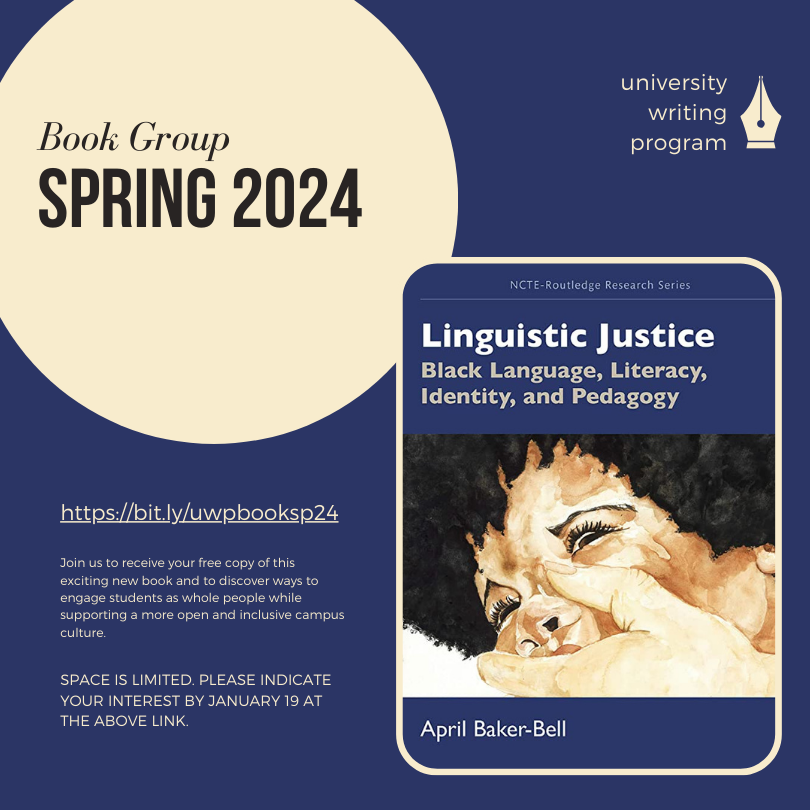Book Groups
The University Writing Program is excited to host another important book group discussion for faculty, staff, and administrators. Our book for spring 2024 focuses on the languages we bring to school and work, and how we can create spaces for learning that are centered on more just and equitable practices. We invite you to participate in our discussion group focused on Dr. April Baker-Bell’s multiple-award winning book Linguistic Justice: Black Language, Literacy, Identity, and Pedagogy (2020, Routledge).
This book group will convene online Feb 8th and 22nd, 2024. Applications for this book group have closed; keep on the lookout for our next book group!
 From the publisher’s website: “Bringing together theory, research, and practice to dismantle Anti-Black Linguistic Racism and white linguistic supremacy, this book provides ethnographic snapshots of how Black students navigate and negotiate their linguistic and racial identities across multiple contexts. By highlighting the counterstories of Black students, Baker-Bell demonstrates how traditional approaches to language education do not account for the emotional harm, internalized linguistic racism, or consequences these approaches have on Black students’ sense of self and identity. This book presents Anti-Black Linguistic Racism as a framework that explicitly names and richly captures the linguistic violence, persecution, dehumanization, and marginalization Black Language-speakers endure when using their language in schools and in everyday life. To move toward Black linguistic liberation, Baker-Bell introduces a new way forward through Antiracist Black Language Pedagogy, a pedagogical approach that intentionally and unapologetically centers the linguistic, cultural, racial, intellectual, and self-confidence needs of Black students. This volume captures what Antiracist Black Language Pedagogy looks like in classrooms while simultaneously illustrating how theory, research, and practice can operate in tandem in pursuit of linguistic and racial justice.”
From the publisher’s website: “Bringing together theory, research, and practice to dismantle Anti-Black Linguistic Racism and white linguistic supremacy, this book provides ethnographic snapshots of how Black students navigate and negotiate their linguistic and racial identities across multiple contexts. By highlighting the counterstories of Black students, Baker-Bell demonstrates how traditional approaches to language education do not account for the emotional harm, internalized linguistic racism, or consequences these approaches have on Black students’ sense of self and identity. This book presents Anti-Black Linguistic Racism as a framework that explicitly names and richly captures the linguistic violence, persecution, dehumanization, and marginalization Black Language-speakers endure when using their language in schools and in everyday life. To move toward Black linguistic liberation, Baker-Bell introduces a new way forward through Antiracist Black Language Pedagogy, a pedagogical approach that intentionally and unapologetically centers the linguistic, cultural, racial, intellectual, and self-confidence needs of Black students. This volume captures what Antiracist Black Language Pedagogy looks like in classrooms while simultaneously illustrating how theory, research, and practice can operate in tandem in pursuit of linguistic and racial justice.”
Reviewers Write:
This book group is sponsored by the University Writing Program. For additional information, please contact Will Banks (banksw@ecu.edu).
Book Trailer (video) showcasing Dr. Baker-Bell and her book:
Explore Past Semester Book Topics
